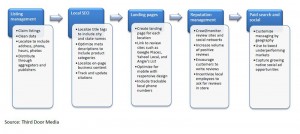California Governor Gavin Newsom signed a first-of-its-kind bill into law on Labor Day that gives fast-food workers a say on their employment terms and industry working conditions, including the ability to raise their own minimum wage to $22 an hour.

The FAST Recovery Act is a radical departure from how the fast-food industry has been regulated in California (with looming implications for how it’s regulated in other states, too). It creates a “fast-food council,” composed of a mix of employees and employer representatives, that gets to establish standards for the minimum wage, working hours, discrimination, and all of the other health and safety conditions.
The International Franchise Association (IFA) spent $615,000 fighting the bill, and big fast-food brands like McDonald’s, Chick-fil-A, Chipotle, and In-N-Out spent more than $1 million in lobbying efforts opposing it. But (September 19, 2022), Newsom placed fast food among “sectors of our economy where we’re falling a bit short,” and said that’s why he was proud to sign “a bill that empowers our workers, particularly in that sector, giving them more voice, giving them more choice, creating a new council.” Here’s why this law represents a landmark shift, for workers both in California and probably even beyond.
What is this newfangled council? And what exactly does it have the power to do?
The council is composed of 10 members. Two of them represent workers, two represent the fast-food chains, two represent the chains’ franchisees, two are worker advocates, and two are government reps. If 6 of the 10 members vote to enact or change a standard, then that measure becomes law in 6 months. Of the members’ duties, what’s drawn the most attention is how, as early as next year, they’re allowed to raise the fast-food minimum wage to $22 an hour if they want (from the current $15).
A $22 hourly rate would be America’s highest—by a lot. Still, the council isn’t allowed to go buck-wild upping pay; the bill actually caps the increase at $22. Once the rate hits this amount, council members can only raise it again each year by either the inflation rate or 3.5%, whichever is less.
Who’s affected by this law?
Chains with at least 100 locations nationally. The law offers a working definition of “restaurants consisting of 100 or more establishments nationally that share a common brand, or that are characterized by standardized options for decor, marketing, packaging, products, and services.” This reportedly includes over 100 restaurant operators spread across the U.S, and impacts about 550,000 California fast-food workers.
Why are the fast-food brands so upset?
Newsom is handing unprecedented control to an unelected regulatory body, they argue. “This bill is a fork in the eye to franchise owners and customers at a time when it hurts most,” IFA president Matthew Haller said in a statement. His group and others say California already has hundreds of regulators whose job is to improve working conditions for fast-food employees. And they contend restaurants will be forced to pass any new costs (from higher wages, say) on to consumers who have grown price-weary. The IFA has pointed to a UC Riverside School of Business study that found a 47% wage hike (the difference between $15 and $22) could cause menu prices to climb by as much as 17%—a burger that used to cost $4.99 could end up costing more like $5.85.
Can a $22 wage actually hurt these restaurant brands?
Newsom doesn’t think so, even after his Department of Finance initially expressed concerns. Neither does Chris Holden, the state assembly member who wrote the bill and is himself a former Subway owner. But the IFA argues franchisees are warning the industry group that they “do not know how they will be able to make it once this bill goes into effect.”
McDonald’s corporate press office released a statement last week arguing the law should “raise alarm bells across the country,” and the National Restaurant Association (NRA), another big industry group, has claimed imposing a $22 wage could saddle California fast-food restaurants with an additional $3 billion in costs per year, pushing “many owners closer than ever to shutting their doors in their communities.”
This seems like it could be good for unions. Is it?
The law is a step toward what’s known as sectoral bargaining, a system popular in Europe where employees and employers negotiate wages and work conditions for everyone industrywide, rather than the way it’s done for the most part in America—via enterprise bargaining, where both parties sit down and renegotiate these conditions and terms for each company, sometimes even store.
One of the law’s biggest reverses is it holds the companies themselves liable for labor violations—the American fast-food industry favors the franchise model, partly because under the way U.S. labor laws are written, the parent company can often avoid being legally classified as a “joint employer,” so gets absolved of liability while the franchise does not. California is moving in the opposite direction here. One of America’s largest unions, the Service Employees International Union (SEIU), praised the bill’s passage as a “watershed moment in the nation’s labor history, giving more than half a million low-wage workers in the fast-food industry a meaningful voice on the job.”
Could creating this fast-food council in California have bigger knock-on effects?
Yes, and that’s one reason why the chains were sweating it. California has the world’s fifth-largest economy, so the new law could mean sweeping changes. But it often sets policy-making standards that smaller progressive-leaning states eventually follow, too.
SEIU president Mary Kay Henry said she expects fast-food workers fighting for higher wages in other states to lobby their lawmakers to craft similar laws. “We are in conversations in several other states,” she said Monday at a press event with Fight for $15, “but because we’re in the discussions stage, we aren’t in a position yet to announce where.”
Separately, the NRA has said it already anticipates similar legislation to be introduced in states like New York, Oregon, Washington, and Illinois.
(13)









